In just three years, much of the McLeod Lake Indian Band’s treaty lands were stripped of their bountiful and valuable trees in a surge of logging that included one clearcut almost 3,000 hectares in size, nearly eight times larger than Vancouver’s Stanley Park.
The extensive logging by the band of its own treaty lands has left two former band councillors questioning why so much forest vanished so quickly, leaving little for next generations.
Defenders of the logging say that beetle infestations made the speed and scale of the logging necessary. But it’s not clear how much of the timber removed had been degraded by beetles, and some scientists say that not immediately clear cutting such forests will allow them to recover far more quickly, while still maintaining healthy habitat for plants and animals.
A logging database maintained by the provincial government as well as satellite imagery reviewed by the Canadian Centre for Policy Alternatives confirms the widespread and recent logging of most of the treaty settlement lands, which were designated as such during treaty negotiations between the band, the provincial and federal governments in 1999.
The logged areas are spread across a few large blocks of treaty land equalling roughly 20,000 hectares in size. They lie about 140 kilometres north of Prince George and constitute but a sliver of what was once a vast, richly endowed traditional territory.
Much of that traditional territory has been turned into a giant corporate extraction zone after decades of industrial logging that radically altered the landscape while lining the pockets of British Columbia’s biggest forest companies.
The treaty agreement stipulated that the newly designated treaty lands were to be nurtured to ensure that sufficient forests were there for future generations of the McLeod Lake Indian Band, which counts about 515 members, most of whom do not live in McLeod Lake.
The agreement went on to say that the band would regularly submit forestry plans to the B.C. government; that a professional forester hired by the band would determine appropriate logging rates, and that whenever logging did occur it would be in a “reasonable” or “gradual” manner that ensured “a smooth transition” for future generations.
Instead, the band stripped its treaty lands of virtually all of their highly valuable, century-and-a-half and older trees in a matter of just a few years, in much the same way that logging companies did at an even larger scale across the band’s traditional territory.
‘Crying out for the land’
Tania Solonas, who was previously an elected band councillor, twice visited the site of some of the most intense treaty land logging — an area identified in the treaty document as Kerry Lake East.
“When I went out there both times, my heart was crying out for the land. I just felt at a loss, really. As a Tse’khene member, I feel a deep connection to the land. It was heartbreaking,” Solonas said.
Her heartbreak was compounded, she said, by knowing that not too far away she had once as a little girl stood with her mother, sister and other band members as they blockaded a logging road in an attempt to stop outside logging companies from turning the band’s traditional lands into the extraction zone they’ve become.
Sundance Inyallie was one of six band councillors elected in 2020 after most of the damage was done. He says he is stunned by what transpired in just a few years.
“I’ve got no words to describe it,” Inyallie said. “We still have the land, but there’s no trees there.”
“People weren’t paying attention, obviously. We just didn’t really understand the rate of logging, and how it increased in the last three years,” Inyallie added, noting that it is the band’s younger members and coming generations that will pay the biggest price for what happened.
“We have no more standing timber on our Treaty 8 lands. And they don’t understand that. There’s no timber left, and there’s not going to be anything there for 50 years, probably even longer,” Inyallie said.
‘Big timber’
A review of data in a searchable provincial government database shows that in the 10 years ending in 2021, nearly 1.9 million cubic metres of trees were cut down on the band’s treaty settlement lands, with 85 per cent of the trees falling in a flurry of logging in the three years ending in 2020.
The same data shows that the logging was done under the McLeod Lake Indian Band’s name or that of Duz Cho Logging, a private company owned by the band.
By far, the most aggressive logging, which not only runs counter to what was in the treaty agreement but also the McLeod Lake Indian Band’s own Land Code, occurred in 2019 when just under 800,000 cubic metres of trees were logged.
Other data show that the companies that received much of that wood were Canfor Corp., Carrier Lumber, West Fraser Timber Co. Ltd. and Dunkley Lumber Ltd. Each own large sawmills in the Prince George or Quesnel areas, a two to three hours’ drive away from the tiny community of McLeod Lake.
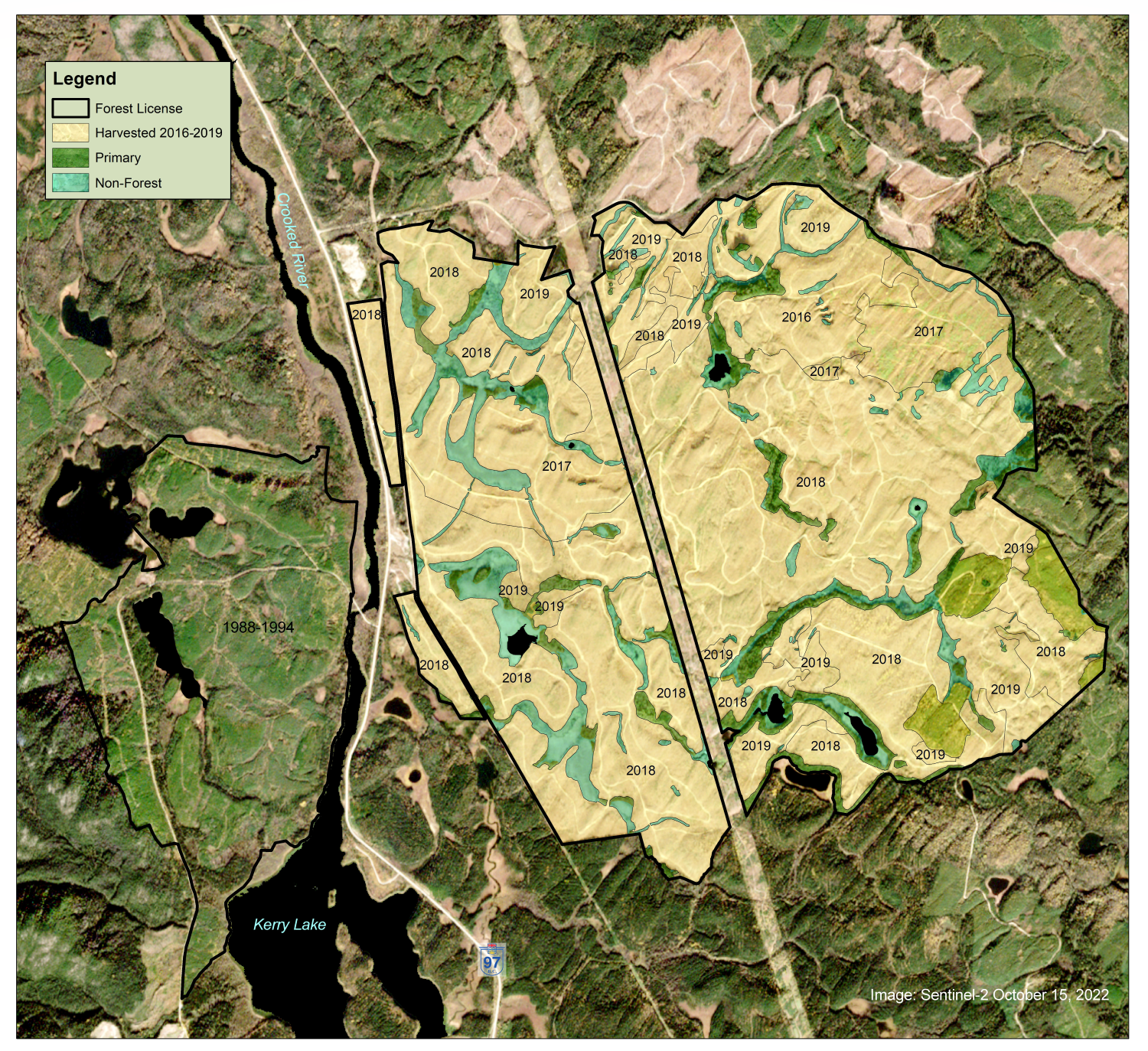
Duz Cho, in the Tse’khene language, means "big timber" or big wood, and was the name given to the company when it was formed in 1988. The company is described as one of the largest Indigenous-owned logging companies in Canada, “harvesting in excess of 600,000 cubic metres annually and performing various non-harvesting contracts such as ore haul, yard services, road building and maintenance.”
The band also owns Duz Cho Construction, which was formed in 2002. It does construction, quarrying and other work on mining, pipeline and other oil and gas developments. Both companies are part of the Duz Cho Group of Companies.
A ‘destroyed’ forest
The CCPA could find no documents dated prior to the onset of the most intense logging activity to indicate why almost all of McLeod Lake’s treaty lands were clear-cut logged over such a short period of time.
Under the terms of the McLeod Lake Indian Band Treaty No. 8 Adhesion and Settlement Agreement, the band was required to file reports with the provincial Ministry of Forests about its logging intentions, documents that might shed some light on what happened and why.
The government was then to make those reports available to the public.
In response to an emailed request for copies of those reports, known as Forest Development Plans, the ministry initially said that it would not release any information short of receiving a formal freedom of information request — a process that may take months and in some cases years to resolve.
Later, however, the ministry acknowledged in an email that no such reports existed, or if they did that the provincial government didn’t have them.
“The McLeod Lake Indian Band is an independent Treaty Nation with lands governed by their own laws,” the email written by the ministry’s communications department said. “The ministry’s approach was to respect the independence of the MLIB in the management of this portion of its territory, and a Forest Development Plan was not submitted to the province.”
The ministry went on to say that “it had no reason” to request other documents of the band that the treaty agreement also stipulated were to be produced, including analyses of “timber supplies” that the band was required to have done by a registered professional forester.
“The McLeod Lake Indian Band Treaty, signed over 20 years ago, is treated as a living document as the Nation and Province work together on the current state of forests and forestry in B.C. True reconciliation means meaningful partnerships, listening to First Nations, and trusting their stewardship of their territories,” the ministry said.
There is only one clause in the treaty adhesion agreement that would allow the band to engage in the kind of radical logging it did. The agreement states that the band could abandon its commitment to a gradual logging rate in the event of “a catastrophic event or a serious risk to the timber,” but falls short of stating what such an event would be, or what information the band would need to provide before changing course.
Blame the beetles
Very little has been said publicly by the band about the logging, other than to say it was necessary because spruce beetles, insects that are endemic to forests in the region, had grown in number and were killing trees. In its email, the Ministry of Forests also says this was the case.
Just how much of a threat this posed is unknown. Neither the band nor the provincial government have posted any information quantifying the alleged damage done by the insects, and with those forests now all logged it’s impossible to tell.
However, according to a YouTube video posted by the band on Jan. 31, 2022, and narrated by the band’s then-elected youth councillor, Jayde Chingee, the spruce beetles wiped out the forest, not the extensive logging to follow.
“The spruce beetle infestation destroyed 4,000 hectares of pristine forest on the McLeod Lake Indian reserve located in the Interior of B.C., Canada,” Chingee says over aerial shots of the logged land and footage of caribou walking along a logging road and through a forest. “Salvage harvesting was required to remove dead trees and prepare the land for reforestation. We lost critical habitat for our animals. We lost critical habitat for our ungulates. And, of course, we lost critical trees for… carbon sequestration.”
The video ends with a request for donations to help the band plant trees, a request that, if met, would underwrite the band’s costs of replanting the lands — something it was obliged to do under the treaty.
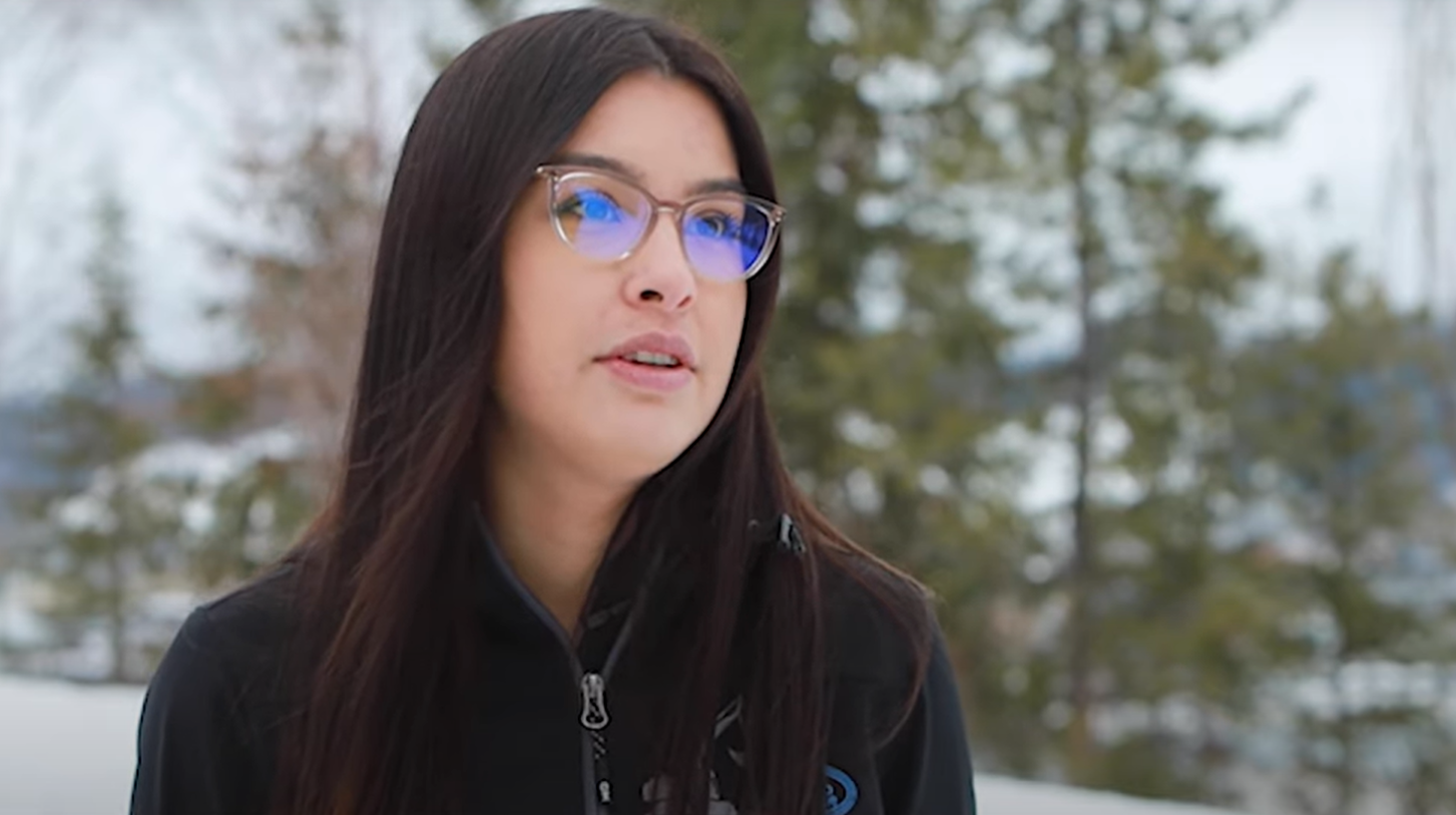
Tree Canada, a national, non-profit organization that plants trees at a large scale, sometimes in partnership with First Nations, amplified the theme of forest destruction.
After noting that it helped the band in 2021 by planting 225,000 of the 4.5 million trees planted on its logged-out treaty lands that year, the non-profit asserted that “the formerly pristine forest” that had once stood on the site “was subject to a spruce beetle infestation that killed most everything,” including 150-year-old spruce, pine and fir trees.
The federal government also provided significant financial assistance to fund tree-planting on lands logged by the band, providing more than $1 million in 2021-22 to plant nearly 900,000 trees, again on grounds that the forests logged by the band had already been “destroyed” by beetles.
McLeod Lake and Treaty 8
Far to the north and east of McLeod Lake, the Duz Cho Group of Companies have also done a lot of logging along the Peace River and its tributaries, on lands that will one day be flooded after the Site C dam megaproject, which is nearing completion, is done and the reservoir begins to fill behind the dam.
The project lies squarely within the territory of many First Nations, all of whom are adherents to Treaty 8, a document that was first signed by representatives of the Dominion government and numerous First Nations in northwest Saskatchewan, northern Alberta, the Northwest Territories and northeast B.C. in 1899. Construction of the dam has caused wrenching divisions within and between First Nations over the course of its lengthy construction.
The West Moberly First Nations in particular waged a long legal battle grounded in their treaty rights to halt Site C, a battle they abandoned "with a heavy heart" last year, in part because there was every sign that the provincial government would push the project through no matter the cost, including turning over hundreds of millions of dollars in direct award contracts to other First Nations that paved the way for the destruction of lands in West Moberly territory.
A recent investigation by the Narwhal based on documents obtained through a freedom of information request shows that Duz Cho received nearly $96 million in direct awards from BC Hydro for work at Site C between 2020 and 2022 alone.
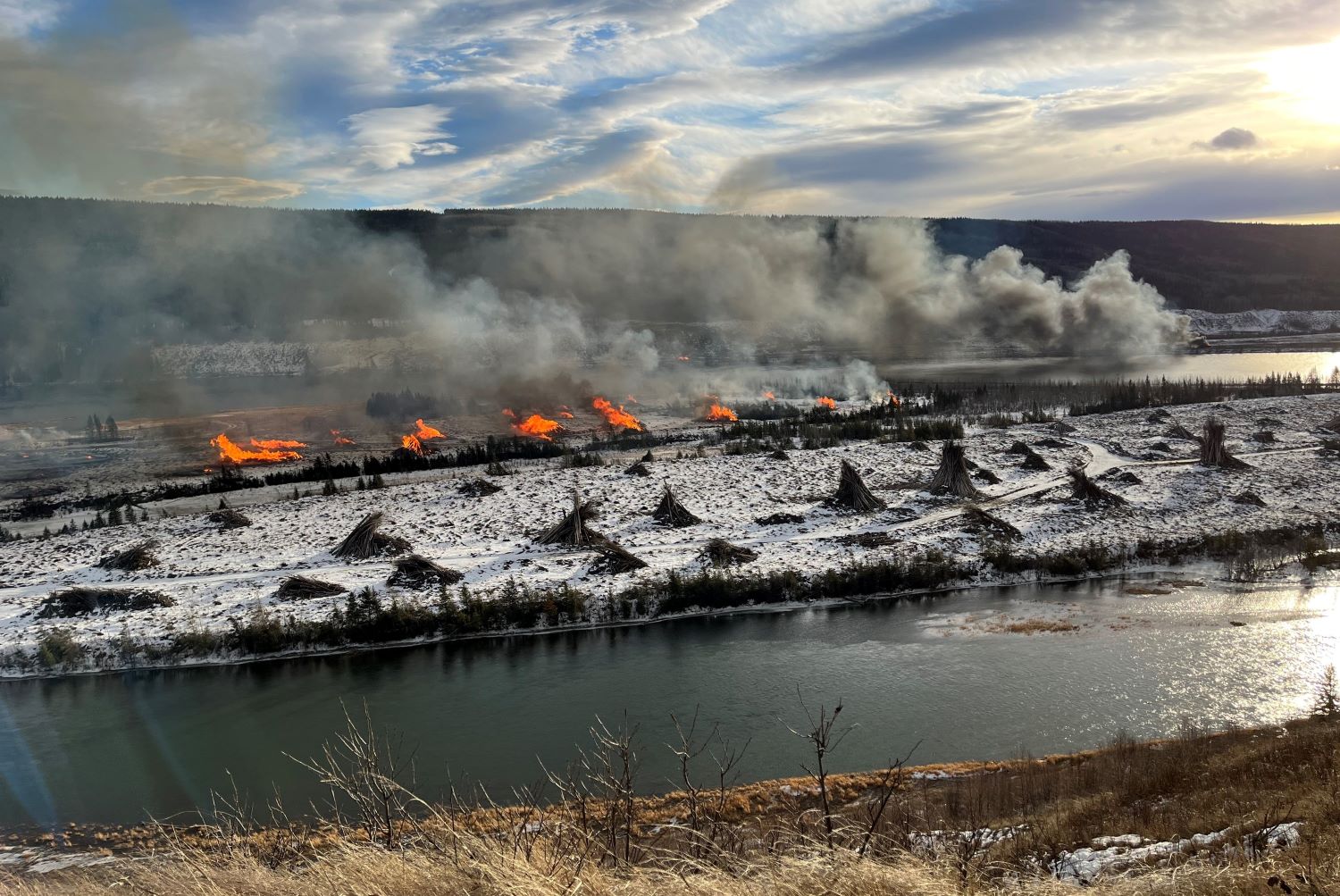
Roland Willson, long-time Chief of the West Moberly First Nations, contends that it would have been far more difficult for the McLeod Lake Indian Band’s companies to obtain Site C contracts had the band not signed the treaty it did with the provincial and federal governments: an agreement that saw McLeod Lake formally adhere to Treaty 8 more than 120 years after the fact.
“If they had not adhered, they wouldn’t have been able to leverage their position on lots of these contracts. They wouldn’t have had any involvement in Site C, for sure. It would have been very hard for them to argue that the Peace River was in their area. Now they have a defined map that Canada, B.C. and McLeod Lake agreed to,” Chief Willson says.
Freefall
The McLeod Lake Indian Band is far from alone in having logged aggressively in the name of salvaging economic value from forests impacted by beetles.
A significant increase in the number of lodgepole pine trees killed by the mountain pine beetle led to a surge in logging on the Chilcotin plateau west of Williams Lake and Quesnel in the 1980s. A much larger mountain pine beetle infestation in the early 2000s saw logging rates soar from Merritt to Prince George and beyond. Almost all of that logging was done by just a handful of companies, including Canfor, West Fraser, Tolko and Dunkley.
On the heels of the mountain pine beetle “salvage logging,” another ramp-up in logging occurred in response to the more recent spread of spruce beetles.
In each case, though, droves of healthy trees fell to the chainsaw along with the beetle-attacked trees, accelerating the depletion of primary forests, including on the McLeod Lake Indian Band’s lands.
The result was a deepening “timber supply crisis” that is now playing out in a brutal new round of mill closures throughout the Interior of the province where the salvage logging took place.
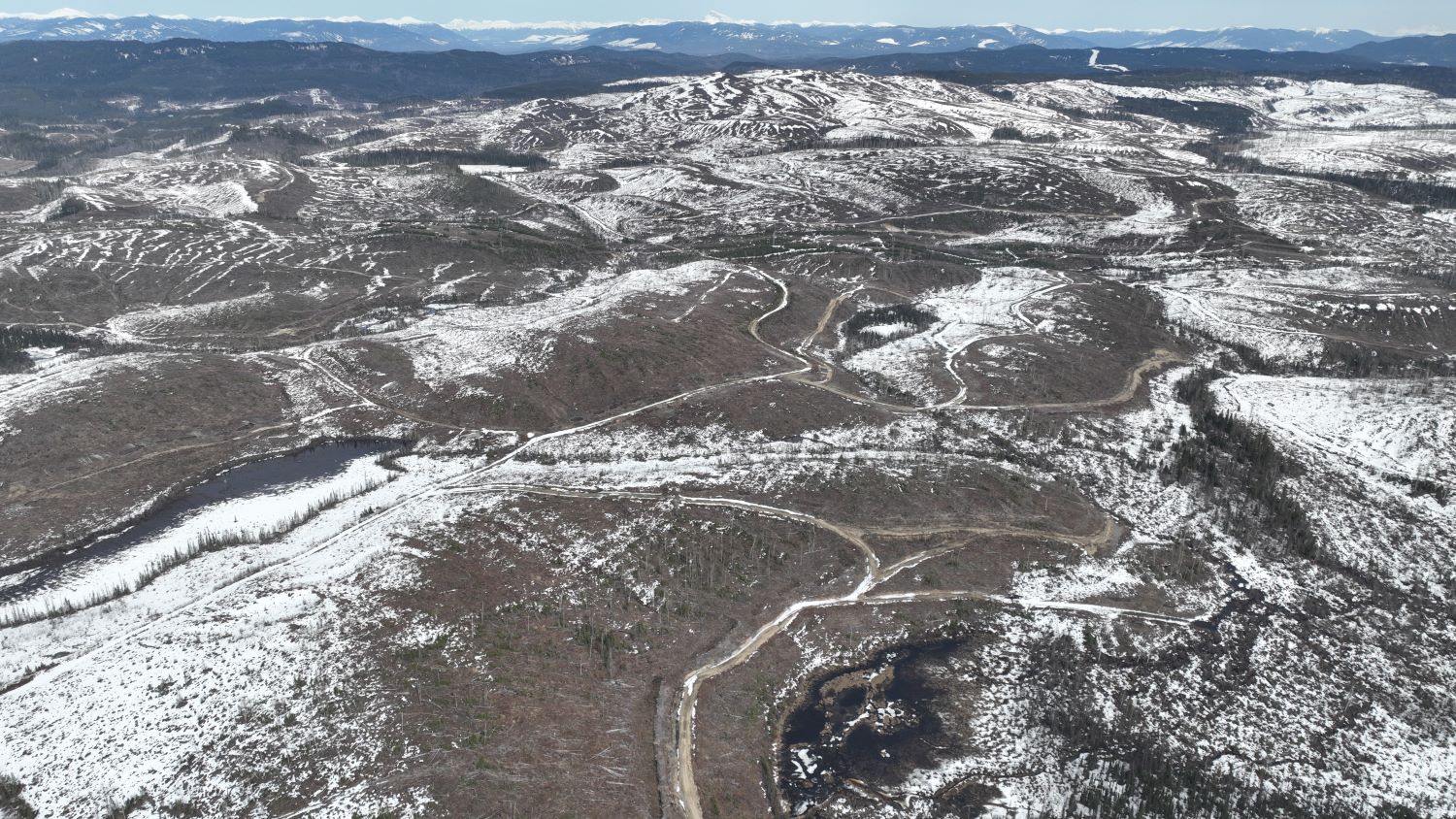
Meanwhile, as enumerated by Jeff Werner during a videotaped February lecture at the University of Northern BC where he is an adjunct professor, 30 per cent of North America’s birds have disappeared in just the last 50 years, 60 per cent of species of concern in Canada continue to decline in number, and B.C. has 2,000 species at risk, with no endangered species law to monitor or protect them.
“That, in ecological terms folks, is freefall,” Werner summarized.
Werner, who is also a regional wildlife ecologist with the Ministry of Water, Land and Resource Stewardship, went on to say during the lecture that natural spruce-dominant forests similar to those logged by the McLeod Lake Indian Band are “very resistant and very resilient” ecosystems that naturally adjust to events like beetle outbreaks.
Werner went on to say that when it comes to assessing the health of forests, time must be taken to understand what is really going on.
“When you do beetle surveys from the air because beetles hit the dominant trees — those at the top of the canopy — you look down and things look pretty rough,” Werner said during the lecture. “But if you were to tell the helicopter pilot, ‘Hey, can you land here?,’ stop and jump the ditch, go into the forest and look up, all you see is green.”
That green is the living trees growing in the understory and shade beneath the taller dead trees that have been attacked and killed by the beetles.
In many cases, those green trees known in forestry parlance as “secondary structure” are just as old and only slightly shorter than the dead trees that shade them.
As the big trees lose their needles and branches following attack by spruce beetles, more light penetrates through the new gaps in the tree canopy, encouraging new growth.
“These are resistant ecosystems to insects,” Werner emphasized.
“Within 10 years, you will not even know that an insect hit, because all that secondary structure, those sub-dominant trees which are about the same age as the dominant ones, will be released. That’s resistance.”
Like Werner, Prince George-Mackenzie MLA Mike Morris has watched with growing alarm as the loss of biological diversity across the province deepens.
Speaking about the forests that recently stood near McLeod Lake, which is in his riding, Morris said:
“It was a perfectly healthy forest that had all the indigenous wildlife in it — the marten, raptors and moose. That’s all gone. And it won’t be around for another hundred years until the land recovers.”
It’s a deeply depressing state of affairs for Morris, who has watched a steady decline in wildlife and disturbing changes in the ecological functioning of forests throughout the vast, heavily industrialized riding he represents.
“The wildlife impact is of primary concern to me,” he says. “But something else I’ve noticed in the last few years is that the hydrological integrity of the area has changed. Everything dries out over the summer months, creating fire hazards. Between those two things, our province is in a pretty tough spot right now.”
‘There’s a real divide here’
According to consolidated financial statements that the band must file annually with the federal government, the value of the logs sold from its treaty lands was $140 million in the nine years ending in fiscal year 2022.
In the notable year of 2019, when the vast majority of the band’s treaty lands were logged, log sales exceeded $82 million.
Such robust revenue reflects the high value of the logs taken off of the band’s treaty lands during those years. According to provincial government data, two out of every three logs that came off of the band’s treaty lands were rated either “Grade 1” or “Grade 2.” These grades are assigned only to logs that can be turned into premium lumber products, and generally would apply to trees that had sustained little if any consequential damage by beetles.
Sundance Inyallie characterizes what unfolded as a pre-emptive strike. The logging occurred “even before” the trees were attacked, he said, and was justified on the grounds that if Duz Cho Logging “didn’t take it, then the wood would be useless.”
He says the decision to kickstart the logging came from the band’s recently re-elected chief, Harley Chingee.
“As councillors, we have no say in the running of our companies. We don’t badger the CEO or managers. He tells them who to hire and who to let go,” Inyallie said.
“We’re treated differently as natives, and that includes from our own leaders,” Inyallie added. “There’s a real divide here.”
Tania Solonas said that at the end of the day, the critical question is not so much who leads and who makes decisions, but how decision-makers are held to account, and how when those decisions are made, they are done with the free and informed prior consent of all band members, particularly when it involves resources on their own treaty lands.
“There needs to be accountability,” she said, whether the lands fall under municipal, provincial, federal or First Nation control. “When you transfer jurisdiction, I believe there needs to be a regulatory piece behind it, that ensures that there is accountability by the First Nation and that ensures that there is enforceability.”
The question of enforceability and accountability becomes even more important when the bigger picture is considered,” Inyallie says.
He emphasizes that while the band was transferred land through the treaty negotiation process, it was but a fraction of what was once its traditional territory. Now, much of that territory has been logged out, in many cases by other companies but also by Duz Cho as well.
“We can’t live on that, especially now that it’s all logged out. Right beside the main village, there’s a huge clearcut too. It’s devastating. You can’t find any moose anymore,” Inyallie said.
Inyallie says he is unclear about how much interest or investment revenue is being generated from that $140 million, and of that how much contributes to funds that band members receive each month. But, he stresses, “we’re not making our own people rich” by doing all that logging.
At present, eligible band members receive about $750 each per month, and a one-time annual bonus of about $7,500 from revenues collected through band-owned businesses and other funding sources.
Chief Chingee did not respond to repeated requests by phone and email to speak about the logging. ![]()
Read more: Indigenous, Labour + Industry, Environment




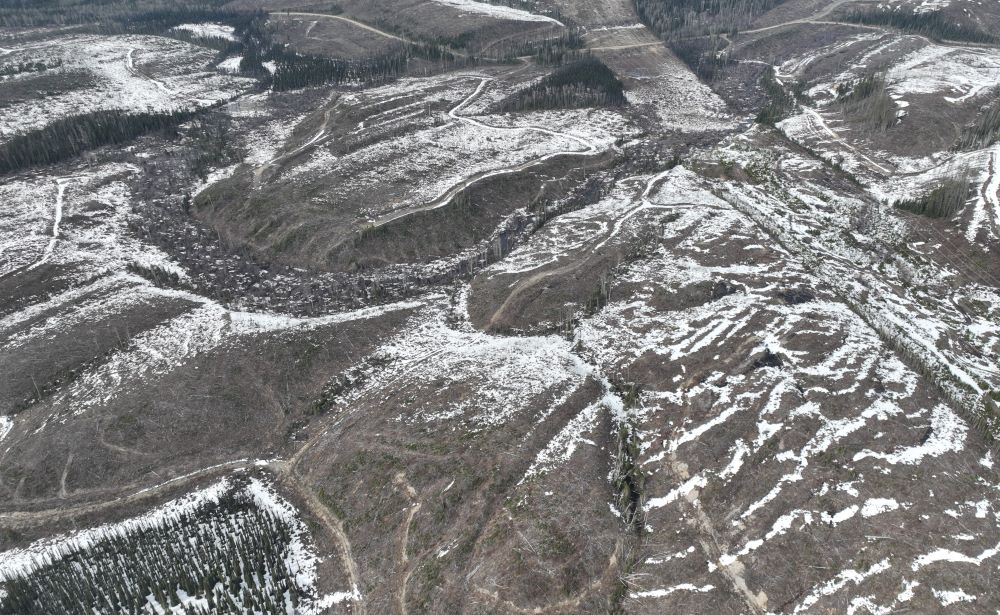












Tyee Commenting Guidelines
Comments that violate guidelines risk being deleted, and violations may result in a temporary or permanent user ban. Maintain the spirit of good conversation to stay in the discussion and be patient with moderators. Comments are reviewed regularly but not in real time.
Do:
Do not: